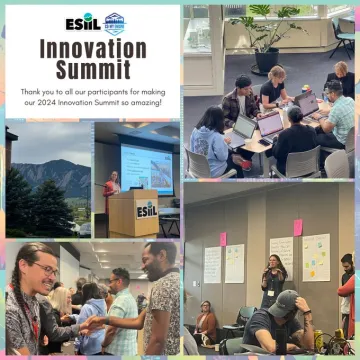CyVerse supporting two NSF Synthesis Centers in Artificial Intelligence and Data Sovereignty
In May 2024, CyVerse staff members joined the second ESIIL Innovation Summit on big data for environmental resilience and adaptation. ESIIL, the Environmental Data Science Innovation and Inclusion Lab, is the National Science Foundation’s two-year old Synthesis Center for Biology focused on Environmental Science. Over 150 researchers from across the country attended the three day event in Boulder, Colorado to promote best practices for ethical, open science focusing on data sovereignty and responsible use of AI.

In support of ESIIL’s tribal data science and indigenous data sovereignty efforts, CyVerse software engineer Paul Sarando (Pasqua Yaqui) worked with the international organization Local Contexts to bring “Traditional Knowledge (TK) and Biocultural (BC) Labels” into CyVerse’s Data Science workbench, the Discovery Environment. From the Local Contexts website, TK and BC Labels “offer Indigenous communities a tool to add cultural and historical context and cultural authority to cultural heritage content in their own local digital heritage archives as well as in digital archives, libraries, museums and other digital repositories globally.” The addition of TK and BC Labels allows ESIIL’s tribal working groups and affiliated researchers to annotate and publish data with appropriate metadata for legal, social, and cultural significance.
ESIIL’s 2024 working groups are also incorporating AI and ML into predictions of natural methane emissions, fungi, wildfires, and ecosystem dynamics. The 2025 ESIIL Working Group Applications are currently open.
In October 2024, CyVerse will begin its support of the newest NSF Synthesis Center for molecular and cellular biology called National Synthesis Center for Emergence in the Molecular and Cellular Sciences (NCEMS). NCEMS is headquartered at Pennsylvania State University and will focus on studying the emergence of mesoscale biomolecular organization and function and the discovery of emergent properties of life at the molecular level. NCEMS will be taking applications for working groups, catalyst meetings, and postdoctoral research fellowships later this fall.
